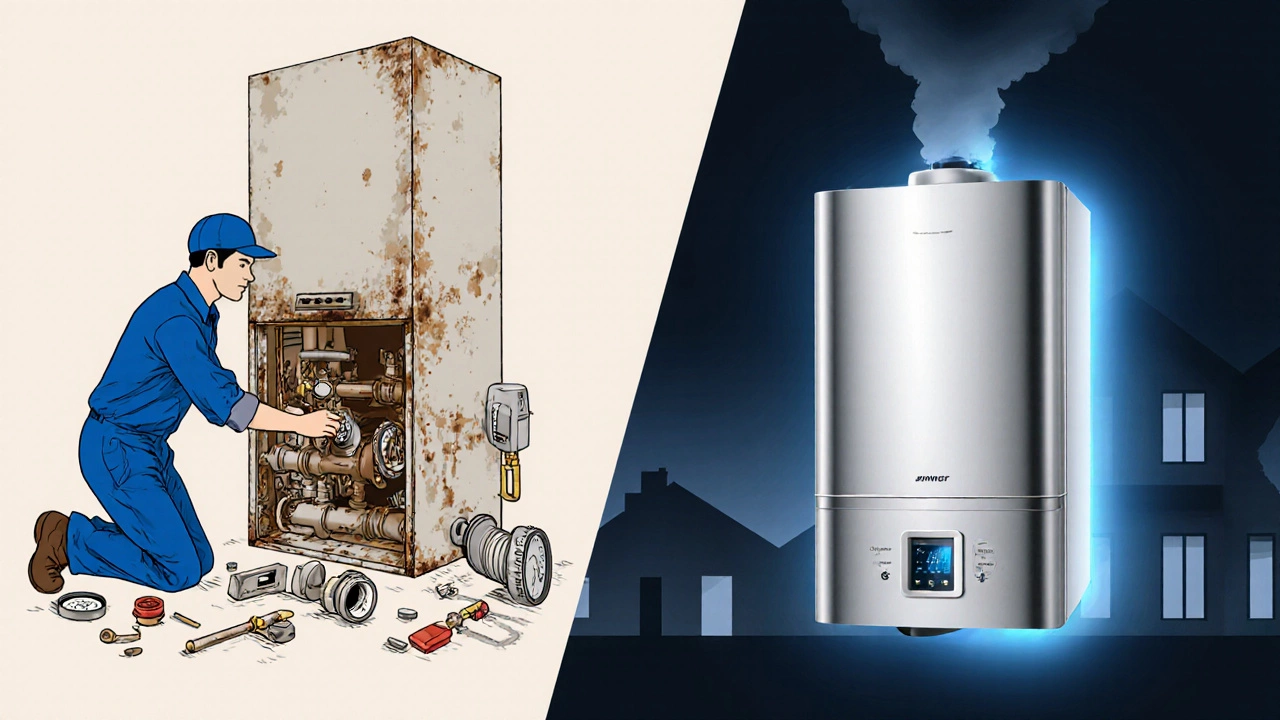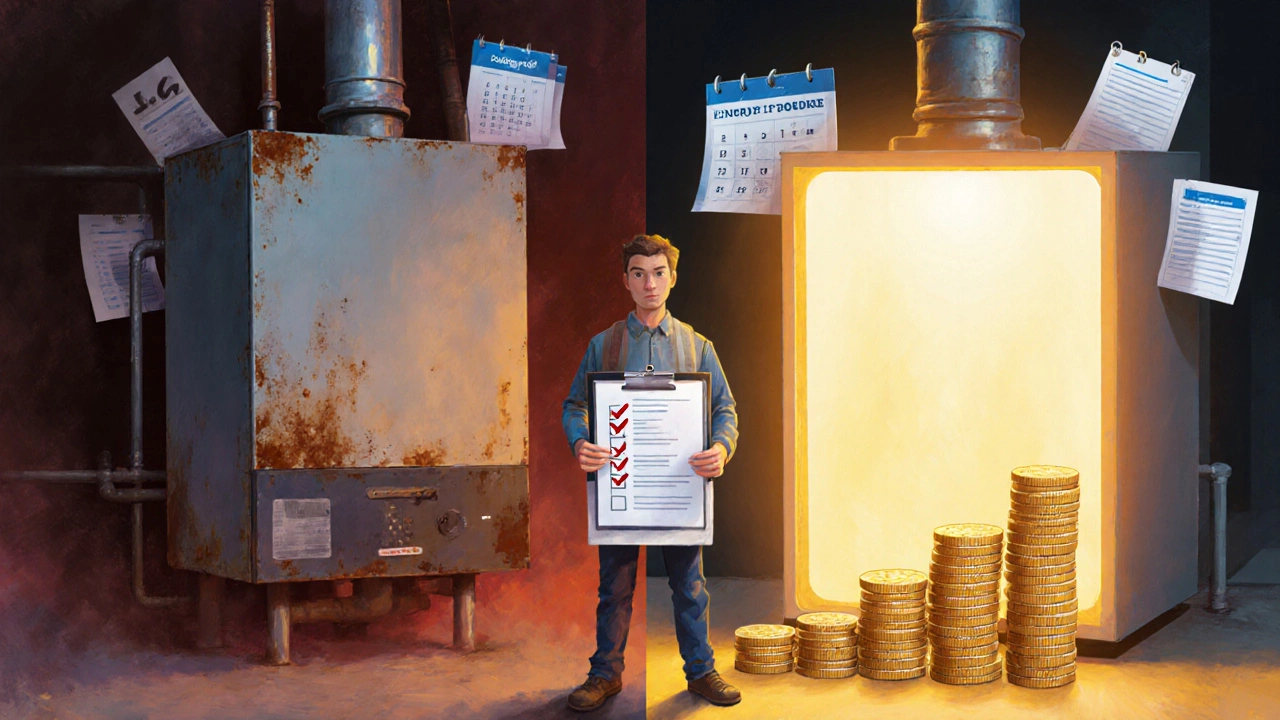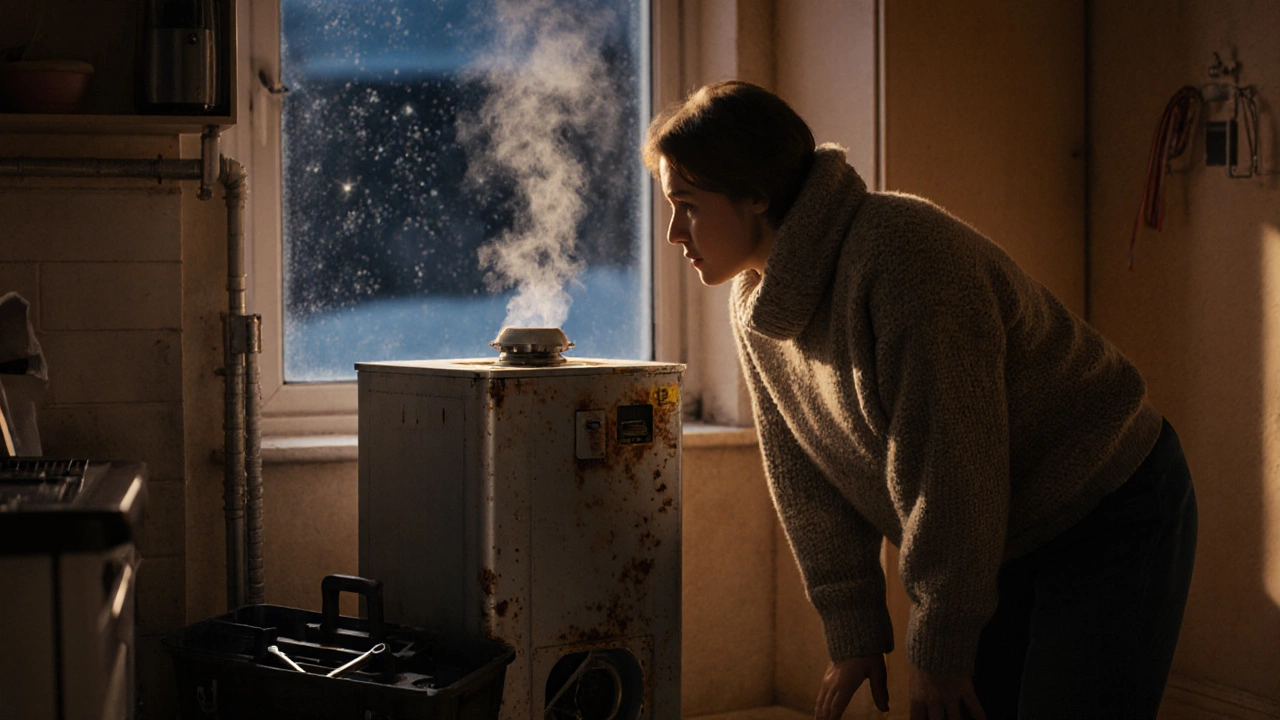Boiler Repair vs. Replacement Calculator
Boiler Information
Energy Savings Estimate
Financial Analysis Results
Key Takeaways
- Measure the boiler's age and condition before any financial decision.
- Compare the boiler repair cost with the price of a new, efficient unit.
- Factor in energy savings, warranty length, and safety risks.
- Professional assessment is usually worth a small fee.
- Use the decision checklist at the end to decide fast.
When your boiler a sealed heating system that supplies hot water and space heating for a home starts making strange noises, leaking, or refusing to fire up, the first thought is often, "Should I fix it or replace it?" In Wellington’s chilly winters, a reliable heat source isn’t optional - it’s essential. This guide walks you through the real numbers, the hidden costs, and the practical steps to answer that question without guesswork.
Assessing Age, Condition, and Expected Lifespan
The first clue is the boiler’s age. Most manufacturers quote a lifespan the typical period a boiler operates before major components wear out, usually 10‑15 years for conventional models. If yours is older than that, you’re already in a risk zone.
Next, look at visible signs: rust on the casing, water stains, a sputtering burner, or error codes on the display panel. A quick visual inspection can tell you whether the problem is a simple sensor glitch or a deeper corrosion issue. If you’re comfortable, you can also check the pressure gauge - anything consistently below 1 bar might indicate a leak or a failing expansion vessel.

Calculating Repair vs. Replacement Costs
The most tangible comparison is the repair cost the total price of parts and labour needed to fix a faulty boiler. In 2025, Wellington plumbers charge roughly NZD 120‑150 per hour, plus parts that range from NZD 80 for a faulty thermostat to NZD 600 for a new heat exchanger.
On the other side, a brand‑new energy‑efficient boiler a modern condensing unit that recovers heat from exhaust gases, boosting efficiency to 90‑95% costs between NZD 4,500 and NZD 7,500 installed, depending on size and brand.
Here’s a quick way to visualise the numbers:
| Scenario | Typical Cost | Potential Savings (5yr) |
|---|---|---|
| Minor fix (sensor, valve) | NZD 250‑400 | ‑ |
| Major component (heat exchanger) | NZD 800‑1,200 | ‑ |
| Full replacement (condensing) | NZD 4,500‑7,500 | NZD 500‑1,200 (energy bill reduction) |
If the repair price climbs above half the cost of a new unit, it’s time to seriously weigh replacement. Remember to add "hidden" costs: frequent breakdowns, higher fuel bills, and the inconvenience of repeated service calls.
Energy Efficiency and Long‑Term Savings
Older boilers often run at 70‑80% efficiency, meaning 20‑30% of the fuel is wasted. A modern condensing model pushes that number up to 90‑95%. The energy savings the annual reduction in fuel costs achieved by switching to a higher‑efficiency boiler can be roughly NZD 300‑600 per year for a typical Wellington household.
Crunch the math: a NZD 6,000 replacement that costs NZD 1,200 more than a major repair will pay for itself in about 3‑4 years thanks to lower bills. After that, you’re saving money each winter.
Warranty, Safety, and Compliance
Most new boilers come with a 5‑year parts warranty and a 2‑year labour guarantee. If yours is out of warranty, a repair could leave you footing the bill for any future failure of the same component.
Safety is another non‑negotiable factor. A cracked pressure vessel or a leaking gas line can turn a simple nuisance into a life‑threatening hazard. In New Zealand, the Gasfitting Code requires regular compliance checks, and a brand‑new boiler automatically meets the latest standards.

DIY Repairs vs. Professional Service
Some owners feel confident tackling a simple thermostat swap or bleeding radiators. While a professional plumber a licensed tradesperson qualified to service and install heating systems will charge for labour, they bring diagnostics tools, safety certifications, and a guarantee on their work.
DIY can save a few hundred dollars, but the risk of mis‑wiring, voiding warranties, or causing a gas leak often outweighs the short‑term gain. If the issue involves the combustion chamber, gas valve, or any internal pressurised component, call a pro.
Decision Checklist - Is Repair Worth It?
- Is the boiler older than 12years?
- Is the repair cost estimated to exceed 50% of a new unit price?
- Will a new boiler improve efficiency rating the percentage of fuel converted to usable heat by at least 10%?
- Do you have a valid warranty that would cover the repair?
- Are there safety concerns (gas leaks, corrosion, rust) that a repair can’t fully address?
- Can you afford a higher upfront cost for long‑term savings?
If you answered “yes” to three or more of these, replacement is likely the smarter move. Otherwise, get a qualified technician to provide a written estimate and revisit the numbers.
Frequently Asked Questions
How long does a typical boiler last?
Most conventional boilers have a lifespan of 10‑15years, while modern condensing models can push 20years with proper maintenance.
What are the main signs that a boiler needs replacing?
Frequent breakdowns, rising energy bills, visible rust, low pressure that won’t stay up, and error codes indicating major component failure are strong indicators.
Can I repair a boiler myself?
Simple tasks like bleeding radiators or swapping a thermostat are doable, but any work involving gas, the combustion chamber, or pressurised parts should be handled by a licensed professional.
How much can I save with a new energy‑efficient boiler?
Typical households see annual savings of NZD 300‑600 on heating bills, translating to a payback period of 3‑4years for a NZD 5,000‑7,000 replacement.
Is there a government rebate for upgrading my boiler?
The New Zealand government’s Energy Efficiency and Conservation Authority (EECA) offers rebates for high‑efficiency heating systems, covering up to 20% of installation costs for eligible homes.

I am an expert in the services industry with a focus on appliance repair. My passion lies in understanding how things work and educating others in simple, engaging ways. This enthusiasm fuels my writing, where I delve into topics around appliance maintenance and troubleshooting. I aim to make these subjects clear and accessible to all readers.